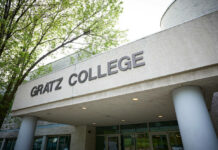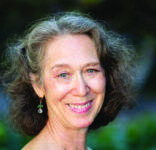
On his Wikipedia page, Elie Wiesel is described as a writer, professor, political activist, Nobel laureate and Holocaust survivor. He published 57 books and wrote countless plays and speeches. His memoir “Night,” about his Holocaust experience, was translated into 30 languages.
Now, the extensive and revealing archive of this singular man will be digitized by Gratz College in Elkins Park.
As an April 15 news release put it, “Gratz has been selected by the Elie Wiesel Foundation for Humanity to host and curate the world’s first digital archive dedicated to the life’s work of Elie Wiesel, Nobel laureate and pivotal public figure in Holocaust education and remembrance.”
“The archive will provide freely available, searchable access to scholars, students, humanitarians and the public-at-large,” the release continued.
The Jewish college known for training educators, being an early adopter of online education and for Holocaust and genocide studies was chosen by the foundation for its expertise in that last area, according to Elisha Wiesel, the survivor’s son.
“Access to this collection will contribute significantly to increased scholarship and impact in the arena of Holocaust and human rights education at a time when this knowledge is needed more than ever,” the son said in the release. “Gratz College is ideally suited to do so in a way that honors and advances my father’s legacy.”
Right now, the Wiesel archive is in a stack of boxes in Gratz’s upstairs library. But by spring 2025, it will become a pillar of the school’s Grayzel Digital Platform, “an online repository of digital collections named for the historian and longtime Gratz College professor Solomon Grayzel,” per the release.
The school further stated that, “The platform aims to democratize Jewish learning through the production of a state-of-the-art web platform and a modular database full of texts, images, videos and sounds that capture the complexities of the Jewish experience in the modern world. Grayzel will deepen intellectual inquiry for Gratz students and emerge as one of the most powerful open-access websites for anyone eager to engage in modern Jewish history and culture.”
Grayzel will also launch with the Holocaust Oral History Archive, Rebecca Gratz’s correspondence and other collections. Alison Joseph, Gratz’s director of digital scholarship, is leading the project. It will feature “advanced search and filter/sort tools, high quality UI/UX, high standard cybersecurity protections and a user-friendly dashboard. It will support significant visitor traffic and include visually powerful and interactive displays,” per the release.
“Over the past few years, we have seen that the future of Jewish learning is online. Grayzel will bring previously unseen sources to the internet, making them accessible in a graphically attractive and digitally sophisticated way for learners of all levels from around the world,” Joseph said in the release. “The robust search and filter tools will pull the collections together, putting them into conversation around specific themes and topics. With this platform, we seek to establish Gratz as a leader in the emerging field of digital Judaica.”
The Conference on Jewish Material Claims Against Germany, the German Government Office of Foreign Affairs and several other foundations and donors contributed major gifts to the project, according to Gratz.

“My vision for Gratz is to become content-driven,” Gratz President Zev Eleff said. “If we are a field leader in Holocaust and genocide studies, what proprietary content can we offer students? Especially being online.”
With online learning, one goal is the “synthesis of resources,” Eleff said. When a student is sitting in front of a computer, he or she should be able to “draw from this resource or that video.”
“And I can assimilate that knowledge together,” Eleff said. “Those are both very important research skills.”
Eleff and his team submitted a proposal to Elisha Wiesel arguing that there were two assets in the collection: physical and digital. Gratz wanted to emphasize the digital because it had the power to put Wiesel in conversation with the testimonial archives of “800 survivors,” Eleff said, referring to the Holocaust Oral History Archive.
“What I understood was there must be a way to leverage the digital age, to leverage the desires of various funders and Gratz’s degree programs to create a platform,” he said.
The president also said that it was important for the Grayzel platform to be free.
“What Gratz historically has been all about is the cultivation of Jewish culture and wisdom,” he said.
“What can I do to help support Jewish literacy? I can give the Netflix of modern Jewish history and culture,” he added. “But one thing is different: I’m not interested in the subscription model.”






